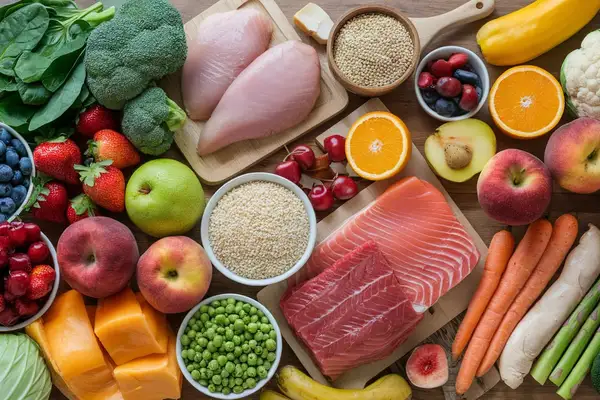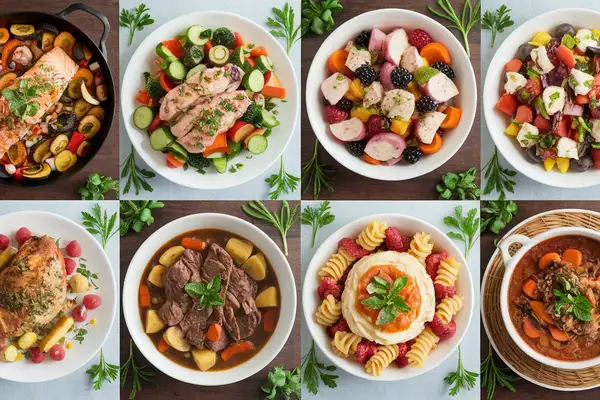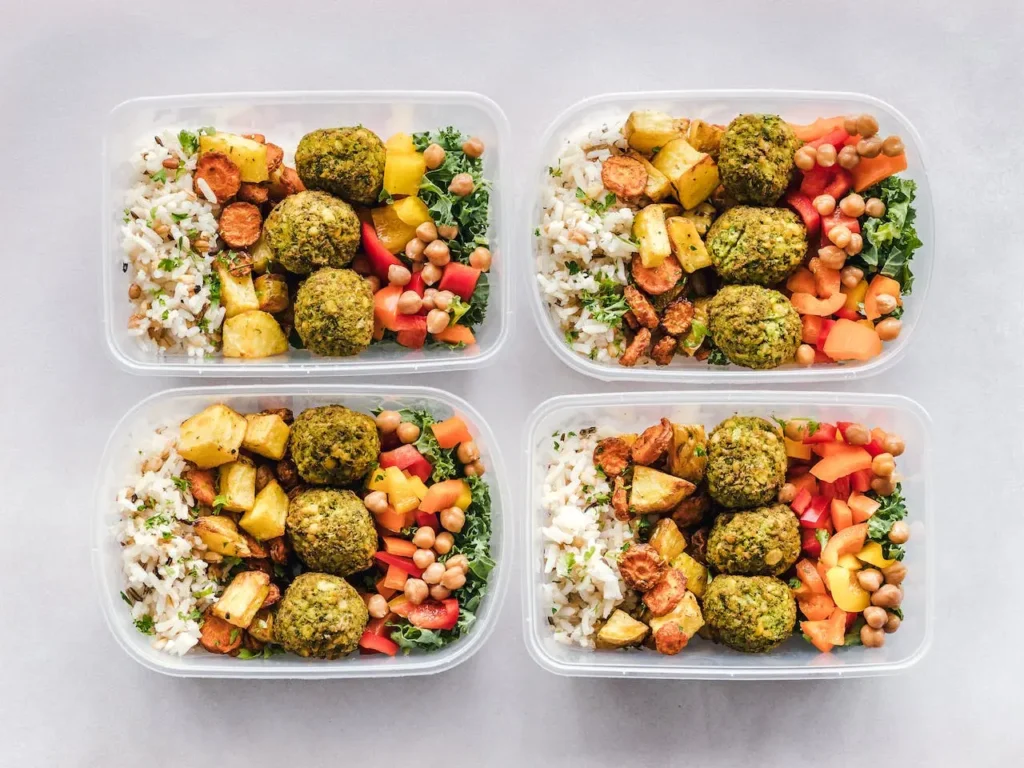7-Day Meal Plan for Gestational Diabetes | A Healthy Guide
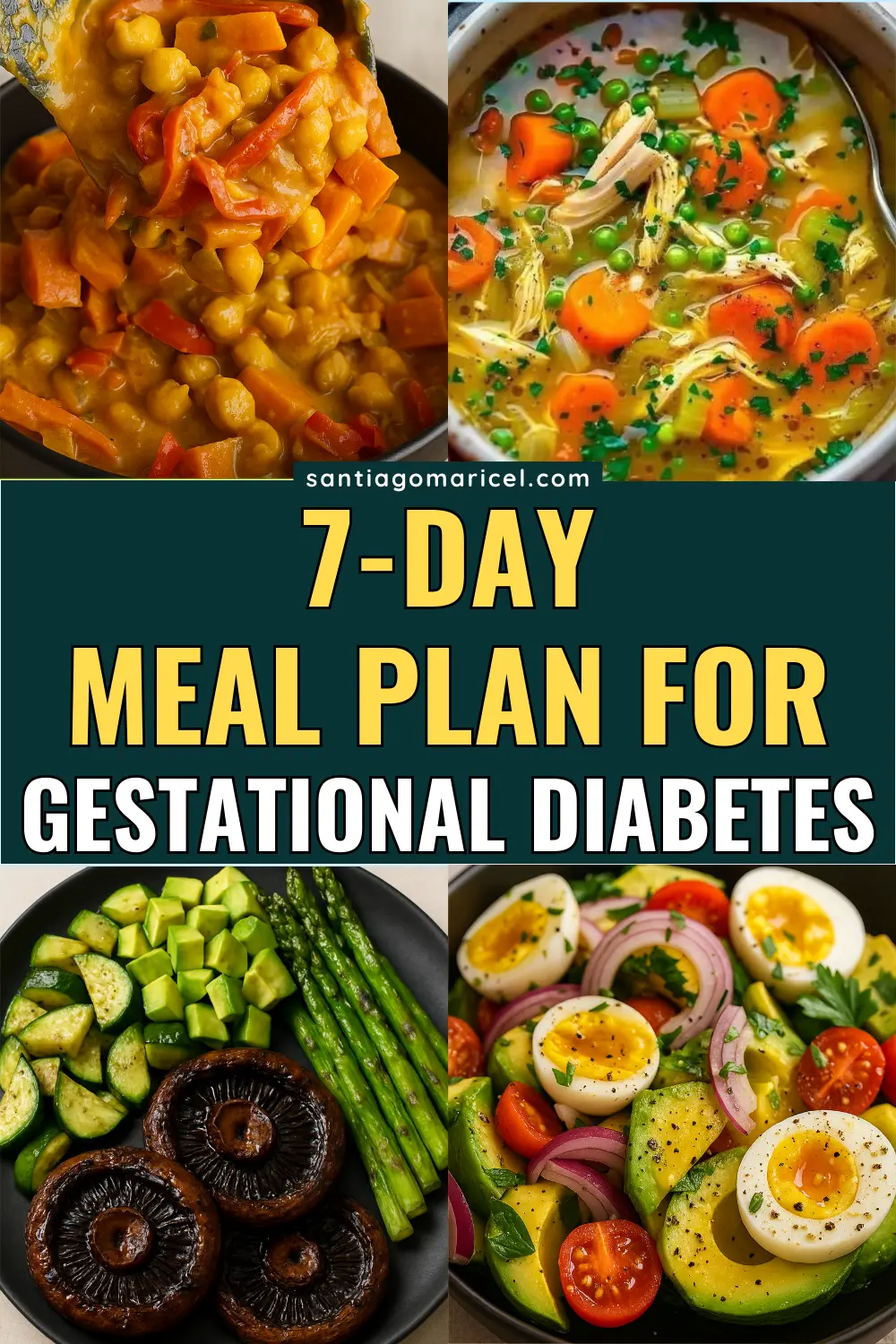
- 7-Day Meal Plan for Gestational Diabetes (Gestational Diabetes Menu)
- Gestational Diabetes Food List
- Gestational Diabetes Foods To Avoid
- Benefits of Following a Gestational Diabetes Diet
- Gestational Diabetes Diet Tips
- Safe Blood Sugar Supplements for Pregnant Mothers
- Resources
- Conclusion
- Frequently Asked Questions (FAQs)
- Citations
This post may contain affiliate links, meaning I may earn a commission if you make a purchase, at no extra cost to you. I only recommend products I trust. Thank you for your support.
Gestational diabetes is a condition that affects pregnant women, causing high blood sugar levels.
It is characterized by high blood sugar levels that develop when the body cannot produce enough insulin to meet the increased demands of pregnancy.
This condition affects approximately 7% of pregnant women and usually occurs around the 24th to 28th week of pregnancy.
While the exact cause of gestational diabetes is unknown, hormonal changes during pregnancy and pre-existing insulin resistance are believed to play a role.
Managing gestational diabetes is crucial for the health of both the mother and the baby.
One of the key aspects of managing this condition is following a well-planned gestational diabetes meal plan.
In this comprehensive guide, we will provide you with a 7-day meal plan for gestational diabetes that is both delicious and healthy and a gestational diabetes food list including what to eat and avoid.
7-Day Meal Plan for Gestational Diabetes (Gestational Diabetes Menu)
Next, we will provide you with a 7-day meal plan for gestational diabetes with delicious and healthy recipes for gestational diabetes.
It’s important to note that individual dietary needs can vary, so remember to monitor your blood sugar levels regularly and adjust portions and food choices based on your needs.

Day 1
Breakfast:
- 2 scrambled eggs with 1 cup of fresh spinach and 1/4 cup cherry tomatoes halved. Serve with 2 slices of whole grain toast.
Lunch:
- Grilled chicken breast (4 oz), mixed greens, cherry tomatoes, cucumber slices, and a drizzle of olive oil and lemon dressing.
Dinner:
- Baked salmon fillet (3 oz) seasoned with herbs and served with a side of steamed vegetables (such as broccoli, carrots, and bell peppers) and quinoa.
Snack:
- Greek yogurt topped with berries and a sprinkle of chopped almonds.

Day 2
Breakfast:
- 1 bowl of oatmeal with 2 sliced bananas, a drizzle of honey, and a sprinkle of chia seeds.
Lunch:
- Lean turkey breast (4 oz), lettuce, tomato slices, and a spread of hummus. Serve with a side of carrot sticks.
Dinner:
- Vegetarian stir-fry by sautéing tofu, mixed vegetables (such as bell peppers, broccoli, and snap peas), and a low-sodium soy sauce. Serve over brown rice.
Snack:
- Cottage cheese with pineapple chunks. 100 low FODMAP snack ideas.
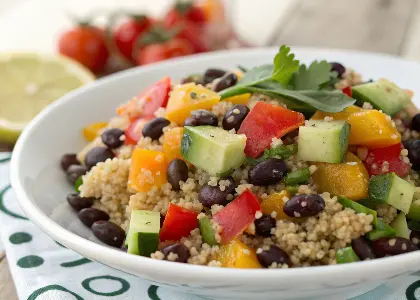
Day 3
Breakfast:
- 1 cup of unsweetened almond milk, 1/2 cup of frozen berries, 1/2 a banana, and a tablespoon of almond butter.
Lunch:
- Quinoa salad with mixed greens, bell peppers, cherry tomatoes, cucumber slices, and a sprinkle of feta cheese. Dress with a light vinaigrette.
Dinner:
- Grilled shrimp (4 oz) stir-fry by sautéing shrimp, bell peppers, zucchini, and snap peas in sesame oil and low-sodium soy sauce. Serve over cauliflower rice.
Snack:
- Hard-boiled egg with a side of carrot sticks.

Day 4
Breakfast:
- Greek yogurt parfait with granola and sliced strawberries.
Lunch:
- Quinoa salad with roasted vegetables (such as bell peppers, zucchini, and eggplant), chickpeas, and a lemon-tahini dressing.
Dinner:
- Lean beef (2 oz) stir-fry by sautéing thinly sliced beef, broccoli florets or asparagus, and snap peas in a ginger soy sauce. Serve over 1 cup of brown rice or 1 small roasted sweet potato.
Snack:
- Small apple with a tablespoon of peanut butter.

Day 5
Breakfast:
- Vegetable omelet using 2 eggs, bell peppers, onions, spinach, and a sprinkle of feta cheese.
Lunch:
- Whole grain wrap with grilled salmon, mixed greens, cucumber slices, and a spread of avocado.
Dinner:
- Vegetarian chili by combining kidney beans, black beans, diced tomatoes, bell peppers, onions, and chili powder. Serve with a side of quinoa.
Snack:
- Baby carrots with a side of hummus.

Day 6
Breakfast:
- Whole grain cereal topped with sliced strawberries, a dollop of Greek yogurt, and a sprinkle of flaxseeds.
Lunch:
- Chicken and vegetable stir-fry by sautéing chicken breast, broccoli florets, snow peas, and carrots in a teriyaki sauce. Serve over brown rice.
Dinner:
- Turkey meatball sub using whole grain bread, turkey meatballs, marinara sauce, and a sprinkle of grated Parmesan cheese. Serve with a side salad.
Snack:
- Greek yogurt with a drizzle of honey.

Day 7
Breakfast:
- Overnight oats by combining 1/2 cup of rolled oats, 1 cup of unsweetened almond milk, 1 tablespoon of chia seeds, and a sprinkle of cinnamon. Top with sliced bananas in the morning.
Lunch:
- Caprese salad with sliced tomatoes, fresh mozzarella, basil leaves, and a drizzle of balsamic glaze.
Dinner:
- Grilled chicken breast (4 oz) seasoned with herbs and served with a side of roasted sweet potatoes and steamed broccoli.
Snack:
- Sliced bell peppers with hummus.
Gestational Diabetes Food List
When creating a gestational diabetes food list, it’s important to focus on nutrient-dense, low-glycemic index foods that can help manage blood sugar levels while providing essential nutrients for both the mother and the baby.
Here’s a list of the best foods for gestational diabetes:
1. Protein Sources
- Skinless poultry
- Fish
- Lean cuts of beef or pork
- Tofu
- Lentils
- Beans
- Greek yogurt
- Eggs
2. Non-Starchy Vegetables
- Leafy greens (spinach, kale, arugula)
- Broccoli
- Cauliflower
- Bell peppers
- Cucumbers
- Zucchini
- Tomatoes
- Carrots
3. Whole Grains
- Quinoa
- Brown rice
- Whole grain bread
- Oatmeal
- Barley
- Whole grain pasta
4. Healthy Fats
- Avocado
- Nuts (almonds, walnuts, pistachios)
- Seeds (chia seeds, flaxseeds)
- Olive oil
- Avocado oil
5. Low-Glycemic Index Fruits
- Berries (strawberries, blueberries, raspberries)
- Apples
- Pears
- Peaches
- Plums
- Oranges
6. Dairy
- Greek yogurt
- Low-fat milk
- Cheese (in moderation)
7. Snacks
- Hummus with vegetable sticks
- Cottage cheese
- Mixed nuts
- Plain popcorn
- Sugar-free yogurt
8. Beverages
- Water
- Herbal teas
- Unsweetened almond milk
Gestational Diabetes Foods To Avoid
When preparing a gestational diabetes food list, it’s important to be mindful of the types of foods to avoid to help manage blood sugar levels.
Here are some of the gestational diabetes foods to avoid or limit:
1. Refined Carbohydrates
- White bread and pasta can cause rapid spikes in blood sugar levels.
- Sweetened breakfast cereals often contain high levels of added sugars.
2. Sugary Foods and Beverages
- Candy and sweets can lead to sharp increases in blood glucose levels.
- Regular soda and sweetened drinks are high in sugar and can significantly impact blood sugar levels.
3. High-Fat Foods
- Fried foods can contribute to weight gain and may affect insulin sensitivity.
- Some processed meats like hot dogs, corned beef, and fermented sausages contain added sugars and unhealthy fats.
4. High-Sodium Foods
- Canned soups and processed foods often contain high levels of sodium, which can contribute to water retention and affect blood pressure.
5. Certain Fruits
- Dried dates, raisins, figs, cranberries, and apricots are concentrated sources of natural sugars and can cause rapid spikes in blood sugar levels.
- Fruit juices like cranberry, apple, orange, and prune juice can contain high levels of natural sugars without the fiber found in whole fruits.
6. Unhealthy Snacks
- Potato chips and snack crackers are often high in refined carbohydrates and unhealthy fats.
- Pastries and desserts are typically high in sugar and may cause significant spikes in blood glucose levels.
7. Alcohol
- Alcoholic beverages can lead to fluctuations in blood sugar levels and should be avoided during pregnancy.
Benefits of Following a Gestational Diabetes Diet
Following a well-planned 7-day meal plan for gestational diabetes is crucial for managing gestational diabetes.
Here are some key reasons why a 7 day meal plan for gestational diabetes is vital:
1. Regulating Blood Sugar Levels
- A 7-day meal plan for gestational diabetes helps to distribute carbohydrates throughout the day, preventing spikes in blood sugar levels. This helps to keep blood sugar levels stable and within a healthy range.
2. Managing Weight Gain
- A well-balanced 7-day meal plan for gestational diabetes ensures that you are getting the right amount of calories and nutrients, preventing excessive weight gain during pregnancy.
- This is important as excessive weight gain can increase the risk of complications for both the mother and the baby.
- Check out the 30-day carnivore diet meal plan for weight management.
3. Providing Adequate Nutrition
- A 7-day meal plan for gestational diabetes ensures that you are getting all the essential nutrients needed for a healthy pregnancy.
- It helps to ensure that you are getting enough vitamins, minerals, and fiber, which are important for the growth and development of the baby.
4. Promoting Healthy Eating Habits
- Following a 7-day meal plan for gestational diabetes helps to establish healthy eating habits that can be beneficial even after pregnancy. It encourages you to make mindful food choices and develop a balanced approach to eating.
5. Healthier Pregnancy
- A well-balanced 7-day meal plan for gestational diabetes helps to promote a healthier pregnancy by providing essential nutrients for both the mother and the baby.
- It can reduce the risk of complications associated with gestational diabetes and support the overall well-being of both you and your baby.
Gestational Diabetes Diet Tips
Creating a well-balanced 7-day meal plan for gestational diabetes involves careful consideration of the types and amounts of foods you consume.
Here are some key tips to keep in mind when creating your gestational diabetes meal plan:
1. Balance carbohydrates
- Include a mix of complex carbohydrates with a low glycemic index such as whole grains, fruits, and vegetables, as well as lean proteins and healthy fats.
- Balance your carbohydrate intake evenly throughout the day to prevent spikes in blood sugar levels.
2. Limit added sugars and refined carbs
- Avoid foods and beverages high in added sugars, such as sodas, candies, and sweetened snacks.
- Minimize the consumption of refined carbohydrates like white bread and sugary cereals.
3. Prioritize lean proteins
- Incorporate lean sources of protein such as skinless poultry, turkey, fish, tofu, and legumes into each meal.
- Protein helps stabilize blood sugar levels and supports fetal growth and development.
4. Portion control
Be mindful of portion sizes to manage blood sugar levels effectively. Use measuring cups or a food scale to ensure accurate portion sizes.
5. Choose nutrient dense foods and healthy fats
- Opt for nutrient-dense foods and healthy fats that provide essential vitamins, minerals, and fiber.
- Include a variety of fruits, vegetables, whole grains, avocados, olive oil, and nuts in your meals.
- Healthy fats support the absorption of essential nutrients and help maintain stable blood sugar levels.
6. Stay hydrated
- Drink plenty of water throughout the day to support proper hydration and assist with blood sugar management.
- Limit the intake of sugary drinks and opt for water or unsweetened beverages.
7. Regular meals and snacks
- Eat regularly and plan for three main meals and two to three snacks throughout the day to maintain consistent blood sugar levels.
8. Monitor blood sugar
- Regularly monitor and keep track of blood sugar levels to understand how different foods affect your body.
9. Seek professional guidance
- Consult a registered dietitian or healthcare provider to develop a personalized gestational diabetes meal plan.
Safe Blood Sugar Supplements for Pregnant Mothers
During pregnancy, it’s crucial for expectant mothers to manage their sugar intake carefully.
While prioritizing whole foods for essential nutrients, there are several safe sugar alternatives and supplements to consider in moderation.
Pregnant women need to consult with their healthcare provider before introducing any new supplements or sweeteners into their diet.
Here are some of the best blood sugar supplements for pregnant mothers:
- Erythritol: This sugar alcohol occurs naturally in some fruits and has minimal impact on blood sugar levels. When used moderately, erythritol is generally considered safe for pregnant women.
- Stevia: Derived from the Stevia rebaudiana plant, stevia is a natural, zero-calorie sweetener. Opt for pure stevia products without added ingredients for safety during pregnancy.
- Xylitol: Another sugar alcohol found naturally in certain fruits and vegetables, xylitol can be a safe sugar substitute during pregnancy when consumed in moderation.
- Monk Fruit Extract: Extracted from the monk fruit, this natural sweetener has no calories and has been used for centuries. Choose pure monk fruit extract free from added sugars or artificial sweeteners.
Resources
These research findings emphasize the critical role of maternal dietary components, dietary patterns, and specific nutrients in the development and management of gestational diabetes.
- Studies have shown that certain nutrients such as iron, folic acid, and antioxidant nutrients have a negative association with GDM, while a low carbohydrate diet and processed meat are positively associated with GDM.
- Advancements in Nutritional Strategies for Gestational Diabetes Management: A Systematic Review of Recent Evidence published on MDPI.
- Nutrition Management of Gestational Diabetes Mellitus.
Conclusion
Managing gestational diabetes through a well-planned meal plan is crucial for both the mother’s health and the baby’s development.
By following a gestational diabetes diet plan, you can regulate blood sugar levels, promote healthy weight gain, and ensure proper nutrition.
With the right approach and guidance, you can successfully navigate gestational diabetes and have a healthy pregnancy.
If you have been diagnosed with gestational diabetes, consult with your healthcare provider or a registered dietitian to create a personalized 7-day meal plan for gestational diabetes that meets your nutritional needs and helps manage your blood sugar levels effectively.
Remember, a well-planned gestational diabetes meal plan is a crucial component of your overall gestational diabetes management strategy.
Additionally, check out these trending articles:
- 7-Day meal plan for kidney disease
- 7-day diet plan for high blood pressure
- How to reverse prediabetes quickly
- 7-day bone broth diet plan
- 90-30-50 diet plan for weight loss
- 1600 calorie high protein meal plan
- 1400 calorie high protein meal plan
- Low FODMAP meal plan
- 7-Day meal plan for pancreatitis
- The menopause diet 5-day plan to lose weight
- Gluten-free meal plan
- 21-day fatty liver diet plan
- 7-day PCOS diet plan
- Fatty liver disease life expectancy
- How to remove belly fast quickly
- 7-day keto meal plan
- Alkaline diet for beginners
- 7-day anti-candida diet plan
Frequently Asked Questions (FAQs)
What are some healthy snack options for gestational diabetes?
Opt for snacks that combine protein and fiber to help stabilize blood sugar levels, for example, greek yogurt with berries, carrot sticks with hummus, or a small handful of nuts.
What should I drink if I have gestational diabetes?
Water is the best choice for staying hydrated with gestational diabetes. Avoid sugary beverages like soda and fruit juice, and limit caffeine intake. Herbal teas and infused water can be refreshing alternatives.
Can gestational diabetes be managed solely through diet?
In some cases, a well-planned meal plan and regular physical activity may be sufficient to manage gestational diabetes.
However, some women may also require insulin or other medications to keep their blood sugar levels under control.
Can gestational diabetes affect the baby?
Untreated or poorly controlled gestational diabetes can increase the risk of complications for the baby, such as excessive birth weight, preterm birth, and low blood sugar levels after birth.
Can gestational diabetes affect future pregnancies?
Having gestational diabetes increases the risk of developing the condition in future pregnancies and developing type 2 diabetes later in life.
However, by maintaining a healthy lifestyle, including regular exercise and a balanced diet, these risks can be reduced.
Can I still eat sweets or desserts if I have gestational diabetes?
It’s important to limit your intake of sweets and desserts as they can cause blood sugar spikes.
However, there are healthier alternatives available, such as sugar-free or low-sugar options, that can be enjoyed in moderation.
How many carbohydrates should I eat per meal with gestational diabetes?
Most healthcare providers recommend around 30-45 grams of carbohydrates per meal for women with gestational diabetes.
How important is it to follow dietary guidelines for gestational diabetes?
Following dietary guidelines is crucial in managing gestational diabetes as it helps regulate blood sugar levels and ensures optimal nutrition for both the mother and baby.
Consistent adherence to these guidelines can reduce the risk of complications associated with uncontrolled blood sugar levels during pregnancy.
Citations
- Sánchez-García, J.C.; Saraceno López-Palop, I.; Piqueras-Sola, B.; Cortés-Martín, J.; Mellado-García, E.; Muñóz Sánchez, I.; Rodríguez-Blanque, R. Advancements in Nutritional Strategies for Gestational Diabetes Management: A Systematic Review of Recent Evidence. J. Clin. Med. 2024, 13, 37. https://doi.org/10.3390/jcm13010037
- Kavita Kapur, Anil Kapur, Moshe Hod; Nutrition Management of Gestational Diabetes Mellitus. Ann Nutr Metab 19 February 2021; 76 (Suppl. 3): 17–29.
Disclaimer: The following 7-day meal plan for gestational diabetes is intended for informational purposes only and should not be considered medical advice. Always follow the guidance of your healthcare team to manage gestational diabetes effectively.
